The learning landscape has expanded rapidly over the last few years, with virtual classrooms becoming a prominent feature in the lives of students of all ages – whether that’s workplace learners, university students, or children at school.
The eLearning market is estimated to be worth a mind-blowing £276 billion by 2026, and finding a course online to learn just about anything you want has never been easier, no matter your location or qualifications.
But have the last few years really changed the way we learn? And what exactly are we learning virtually? We have gathered all the latest facts and figures regarding virtual learning to find out exactly that.
Virtual learning statistics – key findings
- Watching online videos is now the preferred method of learning among those aged 16-54 in the UK, as over a third of people in these age groups say they enjoy this method
- Microsoft, Angular, Excel, Data analytics and Javascript are the most sought-after online courses in terms of online search volumes in the UK in 2022
- The eLearning industry has grown over 900% since 2000
- Women prefer online courses, while men prefer watching online videos
- Online classes about games and game development are now over 360% more popular than they were in 2019
- More people search for online courses about computers and web development than any other topic
- In terms of environmental impact, online classes consume 90% less energy per student than in-person learning
What are the UK's favourite methods of learning?
Instant access to the internet thanks to the phones in our pockets mean that more people than ever are turning to online content – whether that’s structured courses or bitesize YouTube videos – when they need to learn a new skill or piece of knowledge.
In January 2022, we used Censuswide to conduct a survey of 2,000 UK adults with the intention of finding out how the nation feels about online vs in-person learning, at work, in higher education, and in their free time. We asked:
What method(s) of learning do you/would you most enjoy, if any? (select up to three) - Answer options:
- Watching videos online
- An online course
- An in-person classroom environment with others present
- One-to-one tutor in-person
- Listening to audio material online/in an app
- One-to-one tutor online
- Other, please specify
- N/A – There is/are no method(s) of learning in particular that I do/would most enjoy
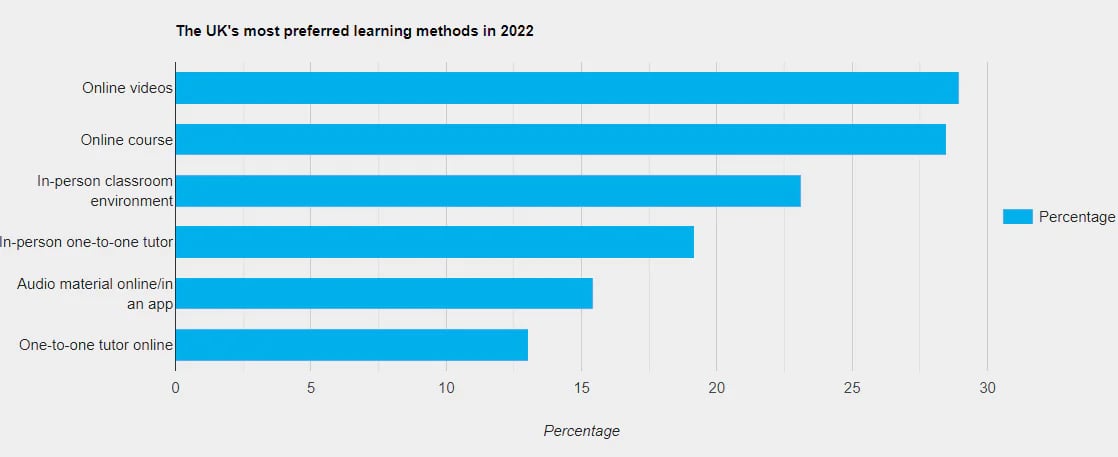
Please note: we omitted responses from this graph that said ‘N/A: There is/are no method(s) of learning in particular that I do/would most enjoy’ (28%) and ‘Other’ (0.5%)
As we can see from the chart:
- The most popular method of learning among UK adults is ‘watching videos online’. Over a quarter (28.97%) of respondents say this is their preferred method of learning
- At a close second, 28.48% of people in the UK say that ‘an online course’ is the method of learning they would most enjoy
- More people say that they don’t have a preferred method of learning (27.93%) than the amount that said they most enjoy an in-person classroom environment with others present (23.13%)
- When it comes to one-to-one learning with a tutor, however, more people preferred an in-person approach to this (19.17%) rather than an online one (13.03%)
Do men and women prefer different methods of learning?
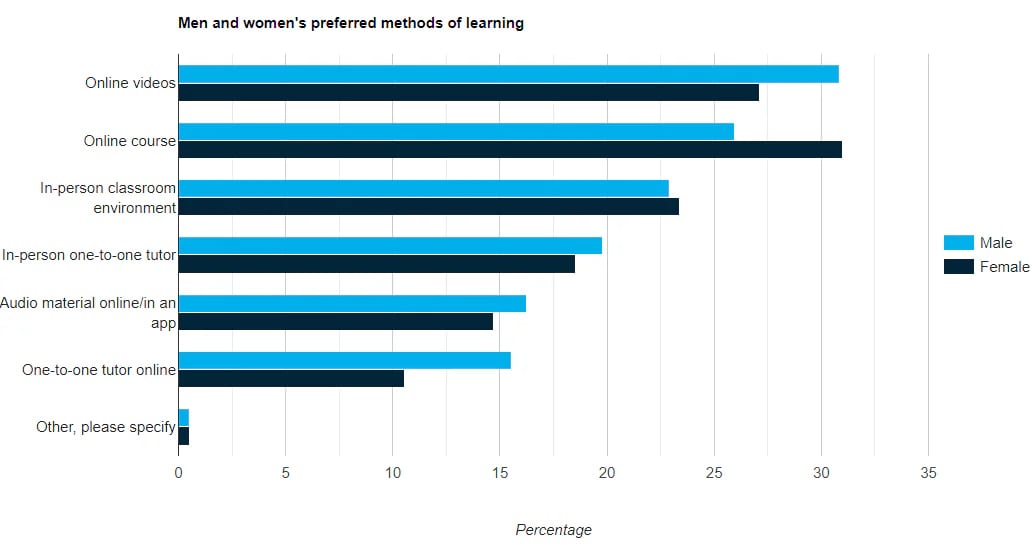
Caveat: for ease of reading, we have omitted the ‘N/A’ answer option from this chart.
As you can see from the graph:
- ‘Watching videos online’ is the most enjoyable method of learning for men, with almost a third (30.85%) saying it is their preferred method
- 'An online course’ is the most enjoyable method of learning for women, with almost 1 in 3 women (30.97%) selecting this answer
- A quarter of men (25.97%) also gave ‘an online course’ as one of their most enjoyed methods of learning
- Men have a stronger preference than women for ‘one-to-one tutors online’, with 15.52% of men enjoying this learning method compared with 10.55% of women
Do different age groups prefer learning in different ways?
We also asked survey participants to specify their age so we could understand if there were any generational differences in attitudes to learning. Are younger people more likely to enjoy learning online?
Well, our survey found that:
- The most popular learning method among adults aged between 16 and 54 is watching online videos, as around a third of respondents in each age category stated they most enjoy this option
- However, the survey found that those over the age of 55 have more of a preference for online courses, with 23.7% of this age group choosing this option
What’s more:
- The second most popular option amongst 16-24-year-olds was in-person classroom environments with others present
- Whilst the second most preferred learning style for those aged 25-54 on the other hand was online courses
- With online videos being the second most popular option for those aged 55 and over
Most popular online courses of 2021
We used Keyword Finder to research a range of online courses to see which ones are most searched for, on average, each month in the UK. This list of courses was obtained from Udemy’s list of their most popular online courses. The search volume data and list of courses was correct as of 26 January 2022.
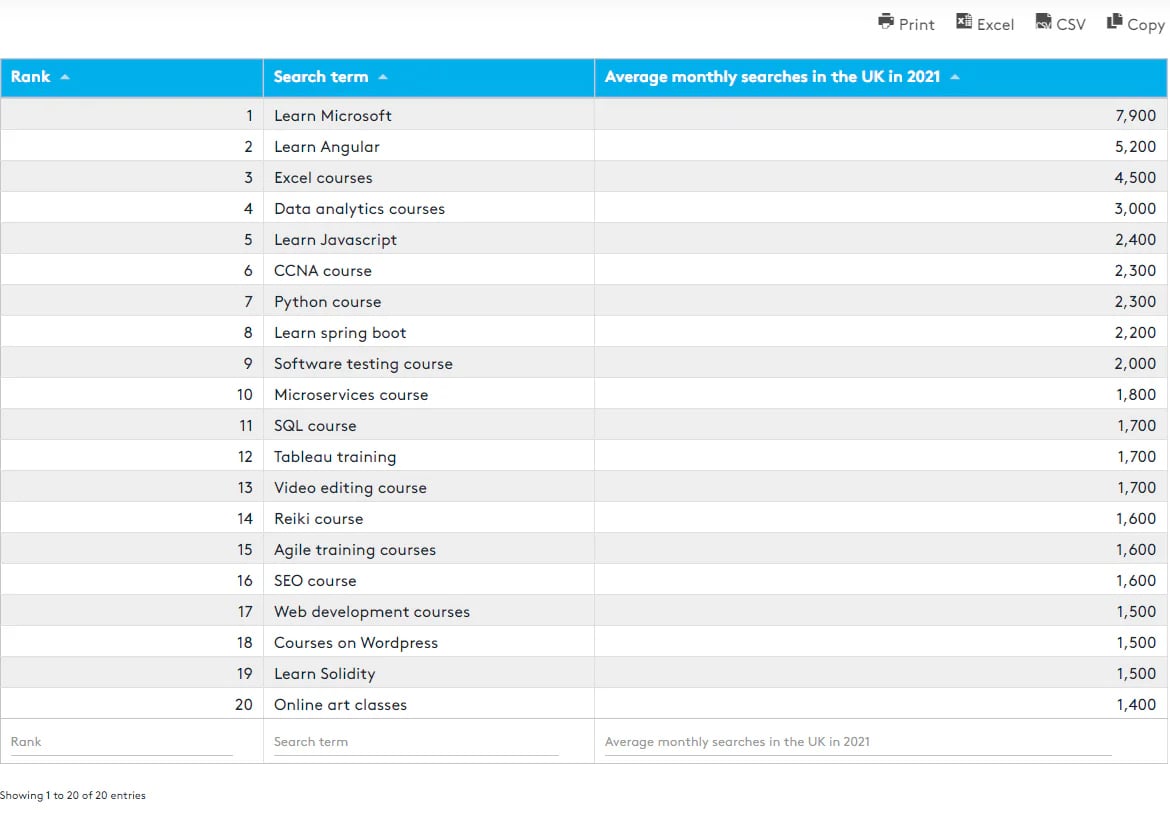
As you can see from the table:
- The most popular search is ‘learn Microsoft’ with almost 8,000 searches every month in the UK. People searching for this are likely looking to learn about software such as Microsoft Office
- The second most common search is ‘learn Angular’, with an average of 5,200 monthly searches in the UK. Angular is an open-source web application framework that is used for building mobile and desktop web applications
- ‘Excel courses’ is the third most popular search term, with 4,500 average searches per month. Users searching for this will be looking for a tutorial on Microsoft’s Excel spreadsheet application
- Most of these web classes are related to IT, computers and web development. Of the 20 search terms included in this chart, 18 of them are in relation to computers, whether that be programming languages such as Python or JavaScript, using programs such as WordPress or Excel, or learning how to edit videos
- Of these search terms, ‘Reiki course’ and ‘online art classes’ are the only terms not relating to use of computers. ‘Reiki course’ garners around 1,600 hits each month in the UK, while ‘online art classes’ gets around 1,400
What do we want to learn about? Most popular topics for online learning in 2022
We wanted to look at a range of popular virtual courses to see which topics remote learners are most interested in. To do this, we looked at 99 different keyword searches from the UK relating to online courses, then sorted these searches into 36 categories based on courses’ topics. We then organised these into broader categories, so we could easily see the most popular topics that are being sought out by people looking for online courses.
This is what we found:
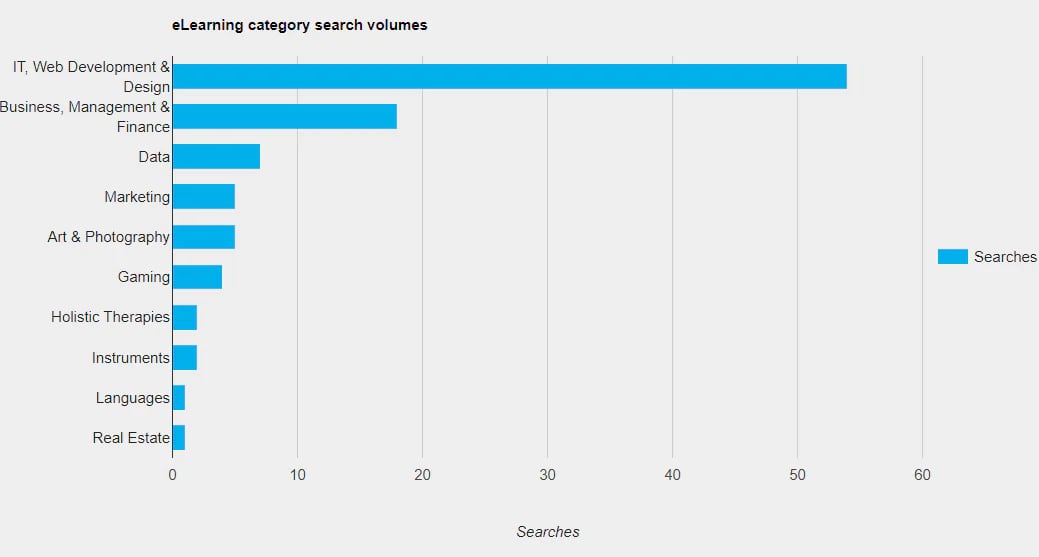
As we can clearly see from this graph:
- More people are interested in virtual classes for IT, web development and design than all the other subjects combined
- Business, management and finance is the second most-commonly searched category for online courses, with nearly one in every four people searching for a class relating to this topic
Has the Covid-19 pandemic changed the way we learn?
We also looked at how many times each individual keyword was searched for, on average, each month in 2019, 2020 and 2021 to find out whether there were any significant differences in search volumes before and during the Covid-19 pandemic.
Especially during the first lockdown of March 2020, many people turned to the internet for help with self-improvement, or picked up a new hobby or skill. But just how many of us did that, and was it a trend that quickly died off after the initial lockdown?
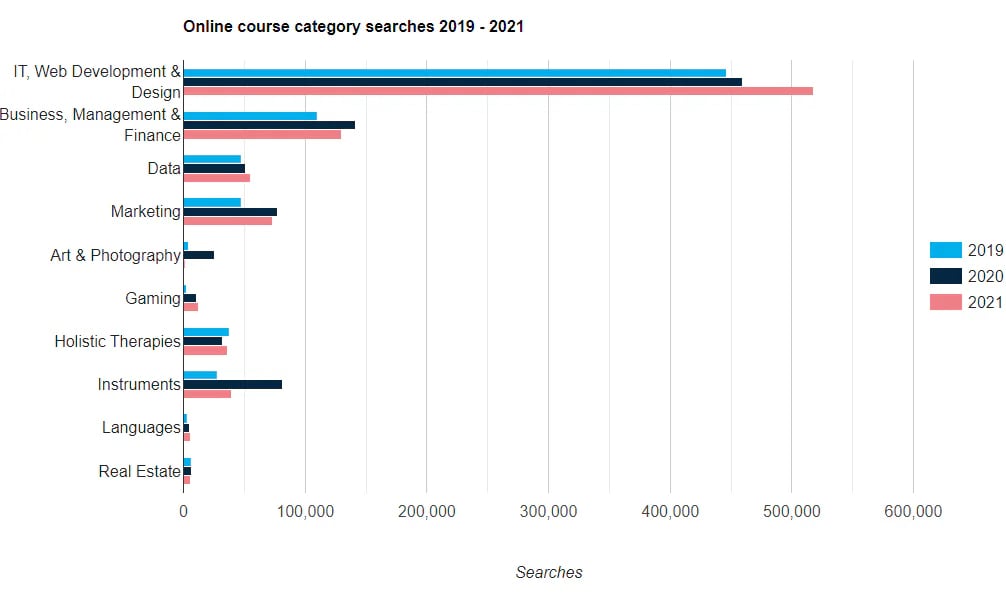
As we can see from the chart:
- The most popular topic by far is still IT, web development and design. Its popularity has only increased over the years, with a 16% increase in searches for classes in this topic between 2019 and 2021
- IT, web development and design, data, gaming and languages are the only topics that have seen a steady incline in popularity over the last three years, with no drops or decreases in search volumes
- Online classes for marketing have seen the largest change over the last two years, with an increase of over 60% from 2019-2020, but a decrease of only 7.2% between 2020-2021
- Searches for virtual classes relating to art and photography saw the biggest change with a huge increase of over 530% in 2020
- Searches for gaming online classes saw a massive rise of over 360% between 2019 and 2021
- Searches for classes to learn to play instruments rose significantly in 2020 during the lockdown, but then went back down in 2021, with an initial rise of almost 200% before a drop of just over 51%
Virtual learning industry statistics – 2022
Hungry for more? Here are more of the latest facts and figures in the world of elearning in 2022:
- Since 2000, the eLearning industry has seen a huge growth of 900%
- The value of the eLearning market is estimated to grow to £238 billion by 2025
- The eLearning market is estimated to grow at an exponential compound annual growth rate (CAGR) of over 21% between 2021 and 2027
- Providing online courses consumes 90% less energy and produces 85% less CO2 emissions per student than face-to-face training thanks to less travel, less third-party buildings being used and less paper being used and wasted
- Delivering content via eLearning can help to increase knowledge-retention rates up to 60%, and participants can learn nearly five times more material in the same amount of time
